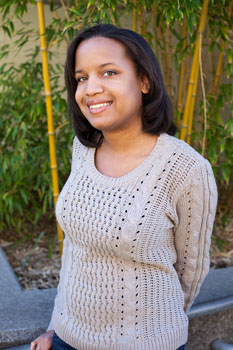Campus News
Risk and reward: undergraduate Lauren Scott explores the world of computer games
Lauren Scott, a 21-year-old UCSC student majoring in computer science and business management economics, is thriving as an assistant game designer.

Designing a computer game is a lot like a relationship, says Lauren Scott, a 21-year-old UC Santa Cruz student majoring in computer science and business management economics.
First, there’s the honeymoon phase when the idea seems perfect in every way. That’s followed by the rocky stage where code starts to get unwieldy and bugs emerge.
“You still love it,” explains Scott, a senior at Porter College, “but it’s frustrating at times.”
Finally, there’s the phase where the designer watches people have fun while playing her game.
“That’s when there’s happiness and a feeling of accomplishment,” Scott says.
That kind of risk and reward is part of what keeps Scott in a field she describes not only as a vehicle for technological change but for cultural change, as well.
It’s pulling together art, science, technology, and the humanities, Scott says. It’s being creative and innovative.
It’s exactly what she wants to do.
A soft-spoken and thoughtful woman who plays the piano and also writes short stories, Scott grew up the daughter of a Dartmouth-trained father who worked in the high-tech industry and a mother who majored in French and was a financial analyst.
It was a computer-savvy home where Scott started out playing learning games, gradually moving to the gritty, multi-player world of battle games like DoTA. But when she came to UC Santa Cruz, Scott didn’t think of game design as her career. She thought about being an optometrist, then switched to literature.
Fate intervened however, when Scott met a few people from UCSC’s highly ranked games and playable media program. Her interest was piqued.
“Games are the leader in a lot of industries,” Scott says over coffee and a scone at an outdoor Santa Cruz café. “They push a lot of technology forward.”
They also change culture, says Scott, pointing to the rise of autobiographical games like Dys4ia, which allows players to immerse themselves in the life of designer Anna Anthropy as she transitioned from male to female.
“Every detail has been coded by that person, so every interaction is deliberate and has meaning,” Scott says.
It’s a whole new way of communication and connection.
Scott has thrived at UCSC. During a Microsoft-sponsored class in experimental game design taught by award-winning designer Brenda Romero, Scott and two other students spent eight long and coffee-fueled weeks designing a puzzle-style computer game they called Half/Way. It not only won them top marks in class but may soon be available as an app for Windows and iPad.
She also worked on UCSC’s social simulation game Prom Week, designed an economics-centered game for Sifteo cubes named Investio, and worked as an assistant designer on a computer game called Xylem which was developed to improve the security of software code through crowd-sourced game playing. Xylem was developed by a team from UCSC and SRI International, and funded by the federal Defense Advanced Research Projects Agency.
“That was such a cool challenge,” Scott says of her time working on Xylem.
But while game design came naturally to Scott, the required math did not.
“There had always been these mental blocks,” Scott says. “I told myself I couldn’t do math because of the way I’m wired.”
Despite early stumbles in math classes, however, Scott forced herself to stick it out. She spent hours pouring over textbooks and rewriting lessons in a way she could understand. She also sought out mentors like Romero, who taught her not only about the practical side of game design but also about the huge community it has built.
“People often think that a successful game designer needs an amazing imagination, and they’re not wrong, of course,” Romero says. “However, the greatest skill a game designer can have is a deep desire to learn and a willingness to seek out things they need to know. Since I have known Lauren, she has consistently done this.”
Sometimes, Scott says, she’ll look around a class and realize not only is she one of the few females in the class but she is also the only African American. Rather than be intimidated, she is motivated, she says.
“To be in a class like that and get up and present a really cool project and get an A, not only shows I deserve to be there but that I’m one of the outstanding students,” Scott says, “and well, that’s a great feeling.”